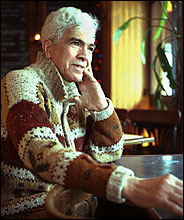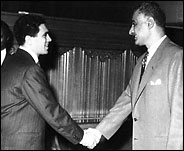| Want to send this page or a link to a friend? Click on mail at the top of this window. |
| Posted February 22, 2003 |
| An Arab Gadly With a Memorable Bite |
__________ |
By ADAM SHATZ |
PARIS — If you can judge a man by the company he keeps, you can also judge him by the enemies he makes. And Mohammed Harbi, Algeria's most renowned intellectual, has certainly made some formidable enemies. Over the last decade, his writings on Algerian history and politics have landed him death threats from the Algerian secret police, radical Islamists and right-wing French settlers still angry over their loss of Algeria to the National Liberation Front or F.L.N., of which he was a high-ranking member as a young man.
 |
 |
|||||
|
|
The members of this improbable alliance of government spies, religious fanatics and unrepentant colonialists have little in common besides their hostility to Mr. Harbi, who embodies an Algeria still struggling to be born: democratic and secular, rooted in North Africa yet open to the West, embracing the Berber as well as Arab aspects of its identity. It may be surprising that someone so powerless is considered to be so threatening. After all, Mr. Harbi represents no party, faction or interest group. Yet a man of principle is always a thorn in the side of authoritarian forces.
"In addition to being an important historical figure and the most respected historian of the Algerian national movement, Harbi is the preeminent engagé Algerian intellectual of the past four decades," says Arun Kapil, an American expert on Algeria who teaches in Paris.
Like many secular Arab intellectuals caught between repressive military regimes and fundamentalist oppositions, Mr. Harbi has found sanctuary in Paris. Algerians here and at home speak of him with an admiration bordering on reverence. In Menilmontant — a neighborhood lined with halal butchers, pastry shops and hip little bars — young men greet him as "Si Mohammed," in Arabic Sir Mohammed.
"I've lived here for 25 years, and I feel very much at home," said Mr. Harbi, a slender, refined man of 69 with close-cropped white hair offset by striking black eyebrows. Sitting at a bistro around the corner from his apartment, he wore a black cashmere turtleneck, corduroys and wire-rimmed glasses, and spoke in lightly accented French. He dispatches quickly with personal questions, as if he'd rather talk about anything other than himself. Writing his memoirs — the first volume was recently published here to considerable acclaim — was, he says, "a strange undertaking, since I don't have a taste for intimate confessions."
It helps to have a good story, and Mr. Harbi undoubtedly has one. He helped lead his country to independence from France in one of the bloodiest colonial wars of the 20th century, only to become a prisoner of the newly independent state. Since fleeing to France in 1973, Mr. Harbi has gone from making history to writing it, establishing himself as an insightful student of Algerian politics and as an unbending champion of secular democracy and human rights. "The Algerian government," Mr. Harbi says, "is not a state with an army, but an army with a state." In books like "The F.L.N.: Mirage and Reality," he has traced the rise of a military-bureaucratic elite that, in his view, has led the country to economic ruin and civil war, displaying flagrant contempt for the people whose praises it ritually sings. "To understand Algeria today," he says, "you have to begin with the massive exclusion of people from power and the rejection of pluralism."
In 1992, a ghastly war broke out between government security forces and Islamist rebels after the army canceled the country's first democratic legislative elections, which the radical Islamic Salvation Front won. Tens of thousands of Algerians have died, and over 7,000 "disappeared." Since the early 90's, the Algerian government has projected itself as the country's only defense against theocratic despotism. In Mr. Harbi's view, this is a false choice, since, he said, most Algerians reject both the state and its radical Islamist opponents. The army and the rebels, he argues, are objective allies: both sides refuse to allow Algerians to govern themselves, both reject political pluralism and both are willing to use extreme violence — and even, some reports suggest, to cooperate behind the scenes — to further their aims.
Wishing a plague on both houses is, of course, the most dangerous position of all in a civil war, and Mr. Harbi has kept a low profile for much of the last decade, evading various assassination plots. "He seemed less nervous about his safety than I was," Stuart Schaar, a historian of North Africa at Brooklyn College, remembers. "I was afraid when he'd take subways. I begged him to take taxis, but he wouldn't."
If Mr. Harbi seems oddly serene in the face of these threats, it's because he is used to the clandestine life. Born in 1933 into an affluent and highly distinguished Muslim family in El-Arrouch, a town in eastern Algeria, he joined the nationalist underground at 15. From 1954 to 1962, the years of the independence war, he held various influential positions within the F.L.N. After the war, he served as an adviser to Algeria's first president, Ahmed Ben Bella.
Yet even at the peak of his influence, Mr. Harbi was always an outsider in the F.L.N. The seeds of rebellion were planted in him by his iconoclastic father, Brahimi Harbi, and by his French high school teacher, an anti-Stalinist Marxist named Pierre Souyri who had fought in the resistance. Under Mr. Souyri's tutelage, Mr. Harbi rejected the Islam-inflected populism common to most Algerian nationalists in favor of libertarian socialism.
Mr. Harbi's secular ideals placed him at odds with most of his colleagues in the F.L.N., who espoused the creation of an "Arabo-Muslim" state. A staunch defender of the few Algerian Jews and French settlers who supported the F.L.N, he says that these men and women "were arguably the most genuine nationalists, because their understanding of Algeria wasn't colored by religion."
As a member of Mr. Ben Bella's cabinet, Mr. Harbi tried in vain to combat the increasingly authoritarian direction of the revolution. He publicly condemned the torture of dissidents and urged Mr. Ben Bella to arm the people to avert a military coup. It was already too late: in June 1965, Col. Houari Boumedienne seized power. Mr. Ben Bella was jailed, followed, two months later, by Mr. Harbi.
Never formally charged, he spent the next six years being transferred from one prison to the next, until he was placed under house arrest in 1971.
Two years later Mr. Harbi escaped across the Tunisian border, with a fake Turkish passport. He ended up in Paris, where he'd studied two decades earlier at the Sorbonne, and where his children from an earlier marriage to a Frenchwoman lived. His first life, as a politician, was over.
But while under house arrest, the revolutionary was reborn as a historian. In the depths of confinement, Mr. Harbi had begun to write a chronicle of the independence movement.
In 1975, he published "The Origins of the F.L.N." It was the first in a series of sober, unsentimental studies that demolished the founding myths of the Algerian revolution, starting with the notion that Algerians had been unified under the F.L.N. and that anyone who opposed it was a traitor.
Using a trove of documents that he had collected during the war, Mr. Harbi revealed the internal life of the Algerian national movement, marked by ideological splits, purges and brutal score-settling. As a witness to the party's power struggles, and as an Algerian patriot of unimpeachable nationalist credentials, he was able to expose the grim underside of the F.L.N. as no scholar could. Without minimizing the wounds of colonialism, he insisted on the indigenous roots of Algeria's troubles, stressing the almost hysterical fear of political and cultural pluralism and the penchant for suppressing it by violence, as well as the weight of conservative, rural traditions.
As the French critic Pierre Vidal-Naquet, a close friend, puts it, "Harbi is that rare example of a political activist who has been able to achieve the historian's detachment from his subject."
By breaking the taboos surrounding the Algerian revolution, Mr. Harbi was placing himself in the line of fire. Algeria's secret police had assassinated a number of exiled dissidents. No sooner had Mr. Harbi arrived than Algerian agents began to stop by his apartment, offering a monthly salary in return for cooperation. French leftists with connections to the Algerian state promised to get him a French passport if he would keep quiet. "I felt extremely lonely in those years," he said.
Today, Mr. Harbi is a celebrated figure in French intellectual life, but his living conditions haven't much improved. He lives in a small apartment on a tiny pension from the University of Paris, where he taught political science for 20 years. "Mohammed refuses to be helped because he doesn't want to depend on anyone," Mr. Vidal-Naquet said, half in admiration, half in exasperation.
The first volume of Mr. Harbi's memoirs (the second is to be published this fall) is in large measure the story of a ferociously self-reliant man. Spanning the period 1945 to 1962, the book provides an absorbing account of Mr. Harbi's life in the underground in France, when he was raising support for the revolution and running from one safe house to the next. And it beautifully conveys the passage from lyrical illusions to lost illusions — the experience of an entire generation of Algerians who experienced the great hopes, and the equally great disappointments, of the independence era.
The most revelatory section may be Mr. Harbi's chapter on his adolescence in the city of Skikda, since it offers a view of the colonial experience that has seldom appeared in print, registering the volatile intimacy that both joined and divided Algerians and the settlers. As the historian Benjamin Stora notes, "Harbi was one of the first writers to show the colonial world as it really was, a world of segregation and inequality but also of contact between communities."
Mr. Harbi's memoir is now prominently displayed in bookstores throughout Algeria, where his work was banned until a decade ago. One Algerian reviewer, the sociologist Lahouari Addi, likened the book to "collective therapy," urging that it be "translated into Arabic and read by as many Algerians as possible." He added, "All is not yet lost in a society that can give birth to activists like Mohammed Harbi."
Mr. Harbi, for his part, doesn't see his life in heroic terms. "My story," he said, chuckling softly, "is the classic story of the radical son of bourgeois parents," a tale of rebellion, disillusionment and downward mobility worthy of Herzen. Does the retired academic ever feel a tinge of nostalgia for his days as a nationalist revolutionary?
"I have to be honest with you," he said, blushing. "For all its miseries, being a political militant is much more exciting than life in academia." A wry little smile flashed across Mr. Harbi's face, and he returned the conversation, once again, to the country on the other side of the Mediterranean.
Copyright 2003 The New Times Company. Reprinted from The New York Times, Arts & Ideas, of February 22, 2003.
| Wehaitians.com, the scholarly journal of democracy and human rights |
| More from wehaitians.com |